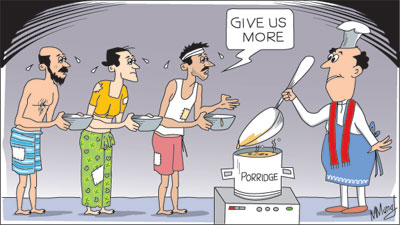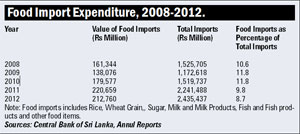Columns
Macroeconomic weaknesses threaten food security
View(s):Macroeconomic weaknesses could pose a serious threat to food security. The accessibility of poor households to basic foods is becoming increasingly difficult owing to their high costs, as well as higher expenditure on other essentials.
Weaknesses in public finances, the trade balance and external finances are increasing prices of basic food imports such as wheat flour, sugar, milk, potatoes, lentils (dhal) and other subsidiary foods. The consequent inaccessibility of poor households to these undermines their food security. This impact of macroeconomic conditions on food security is not generally appreciated.

Weaknesses in the country’s external finances due to recent large trade deficits have necessitated corrective actions to reduce the trade deficit. Depreciation of the currency and higher tariffs on food imports have increased prices of basic food commodities such as dhal, sugar, milk, wheat flour and potatoes. The increases in import duties of essential food items in 2012-13 were due to weaknesses in the trade balance and a means of increasing government revenue.
Fiscal weaknesses
Fiscal weaknesses are a serious concern for food security. The imposition of higher tariffs in 2012 and 2013 to increase revenue increased prices of food. The imposition of higher direct or indirect taxes and withdrawal of subsidies on other essential expenditure items such as transport could reduce poor households’ income to access adequate food needs.
Large fiscal deficits are inflationary and the rise in prices affects the food security of poor households. Fiscal weaknesses also impair the government’s capacity to implement interventionist programmes to assist the poor and could result in the shrinkage of social security benefits.
The recent increases in tariffs on food items, it is argued is a measure of protection to increase domestic production. It is in fact the need to reduce the trade and fiscal deficits that induced increases in tariffs. Admittedly, price increases could be incentives for higher domestic food production of some crops. However, food security of low income households are adversely affected by increased prices.
Sound macroeconomic fundamentals
It is rarely recognised that these macroeconomic conditions are determining factors in food security. The conventional view is that domestic production of food is the determinant of food security in the country.

Discussions on food security have been mostly about growing more food to feed the people rather than the state of the economy on which Sri Lanka’s food security is very much dependent. Self-sufficiency in food has been presumed synonymous with food security and this perspective has muddled thinking on food security.
Food security is not synonymous with self-sufficiency in food production. It is Sri Lanka’s capacity to have adequate food supplies, either by domestic production or imports that enable households to obtain adequate quantities of food for their nutritional needs at affordable prices. In fact food security in Sri Lanka may be better served by diversification of the economy to improve the capacity to access international markets rather than by producing all food needs domestically.
Besides, food self-sufficiency is not an attainable goal for Sri Lanka, as it is not possible to produce all the country’s food needs owing to constraints of climate and resource availability. There are items of food that we cannot grow in the country such as wheat and dhal. Then there is the unrealistic expectation of being self-sufficient in the production of items that very little is produced at present. Only about 5 per cent of our requirements of sugar and about 40 per cent of our current requirements of milk are produced domestically.
The demand for these two commodities has been rising in recent years and will rise with increases in population and incomes. It is possible to increase production of these items to meet a higher proportion of domestic needs, but not be self-sufficient in them due to limitations in land availability and other resources. The high costs of production in the country may make it economically better to import these commodities rather than produce them locally.
Significance of agricultural production
Admittedly excessive dependence on food imports could undermine the country’s long run food security, as well as erode the capacity of rural households to obtain adequate food. Therefore, wherever possible agricultural production should be increased for domestic consumption and exports.
Furthermore, while overall economic growth and diversification are important factors in ensuring national food security, agricultural development has a vital role to play in ensuring food availability at household level. Increased agricultural production by improving incomes of rural households could enhance household access to food considerably, as about one-third to one half of the country’s households is rural and derive incomes directly or indirectly from agricultural activity.

Farm households would have more income, especially the subsistence farm households. Non-farm households would have greater access to food through increased incomes while non-agricultural households would have better access to food because of the likelihood of lower prices. Improvement of agricultural productivity through technological change is an essential strategy to achieve food security of a significant proportion of the population.
Food imports
There is a distorted view that the country’s economic problems, especially food insecurity, could be resolved by a substantial decrease in food imports. This is not so as food imports are less than 10 percent of total imports. Food imports have declined dramatically from around 40 to 50 per cent of total imports from 1955 to 1975 to 20 per cent in 1980 and to below 12 per cent in 2000. From 2004 to 2007 food imports reached single digit level. It fell below 10 per cent again in 2011 and 2012.
Conclusion
Macroeconomic conditions are determining factors in food security. A healthy balance of payments, adequate foreign exchange reserves and manageable fiscal deficits are important to ensure adequate food supplies and the access of households to food at reasonable prices in Sri Lanka. Increased agricultural production could enhance the supply and availability of food, especially for rural households, but food security in Sri Lanka is very much dependent on economic development and macroeconomic stability.
Follow @timesonlinelk
comments powered by Disqus

